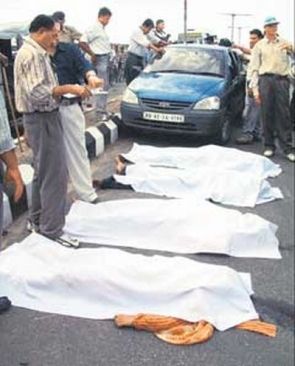 Former Intelligence Bureau Special Director Rajinder Kumar, accused by the Central Bureau of Investigation of murder in the Ishrat Jahan encounter case, was allegedly the brain behind the affidavit filed by the Union home ministry declaring the 19-year-old victim a terrorist.
Former Intelligence Bureau Special Director Rajinder Kumar, accused by the Central Bureau of Investigation of murder in the Ishrat Jahan encounter case, was allegedly the brain behind the affidavit filed by the Union home ministry declaring the 19-year-old victim a terrorist.
In its supplementary chargesheet in the encounter case, the CBI has alleged that Kumar had given inputs to the home ministry that Ishrat was a terrorist to prove that the encounter, in which the Mumbai girl was killed along with three others, was a genuine one, agency sources said.
The then Under Secretary in the Home Ministry, R V S Mani, gave two affidavits before the Gujarat high court in less than two months, contradicting opinions on the antecedents of Ishrat, they said.
While the affidavit filed on August 6, 2009 stated that Ishrat and three others were terrorists, in the one filed on September 30, 2009, Mani claimed that there was no conclusive evidence to suggest she was a terrorist.
The agency has alleged that the affidavit of August 6, 2009 was a brain child of Kumar who was apprehensive of his role coming under scrutiny in case a detailed probe was carried out in the encounter, which the CBI has termed as fake.
CBI sources said the supplementary chargesheet, which is also the concluding one in the case unless directed by the competent court, filed by the agency this week, does not go into the antecedents of Ishrat.
"Nothing changes the fact that it was a joint counter terror operation of the IB and Gujarat police which was turned into a staged encounter. The antecedents of the four victims does not change the fact that it was a fake encounter," a senior CBI officer said.
Nearly a decade after Ishrat was murdered along with her friend Javed Sheikh alias Parnesh Pillai in Gujarat and two others believed to be Pakistani nationals, the CBI filed a
supplementary charge sheet naming Kumar, who was the then joint director of IB and was posted in Gujarat.
He was charged with 120-B (criminal conspiracy) for 302 (murder) and other sections of Indian Penal Code besides various provisions of the Arms Act.
Kumar has been additionally charged under the Arms Act, with the CBI alleging that he had provided arms to the accused on June 14, 2004, a day before the encounter took place.
The CBI alleged in its supplementary charge sheet that Kumar handed over arms and ammunition to G Singhal of Gujarat police, who passed them to Tarun Barot through Nizamuddin Sayeed. These arms and ammunition were used in executing the crime.
Along with Kumar, those named in the chargesheet are serving officers P Mittal, M K Sinha and Rajiv Wankhede, who have been booked for criminal conspiracy, wrongful confinement, kidnapping and wrongful concealment besides various sections of the Arms Act.
In its first chargesheet filed in the case on July 3 last year, the CBI had named the four officers but not identified them as suspects, while terming the encounter as fake and a joint operation by the IB and Gujarat police.
Indian Police Service officers D G Vanzara, P P Pandey, Girish Singhal, besides Barot, N K Amin, J G Parmar and Anaju Chaudhary had been named as accused.
The CBI had said Ishrat and others were in the custody of Gujarat police before being killed and, in fact, she and Javed had been interrogated by Kumar at a farm house on the outskirts of city, where they were kept under confinement.
All the four were taken to the encounter spot near Kotarpur Waterworks blind-folded before being shot dead in cold blood, CBI had said.











 © 2025
© 2025